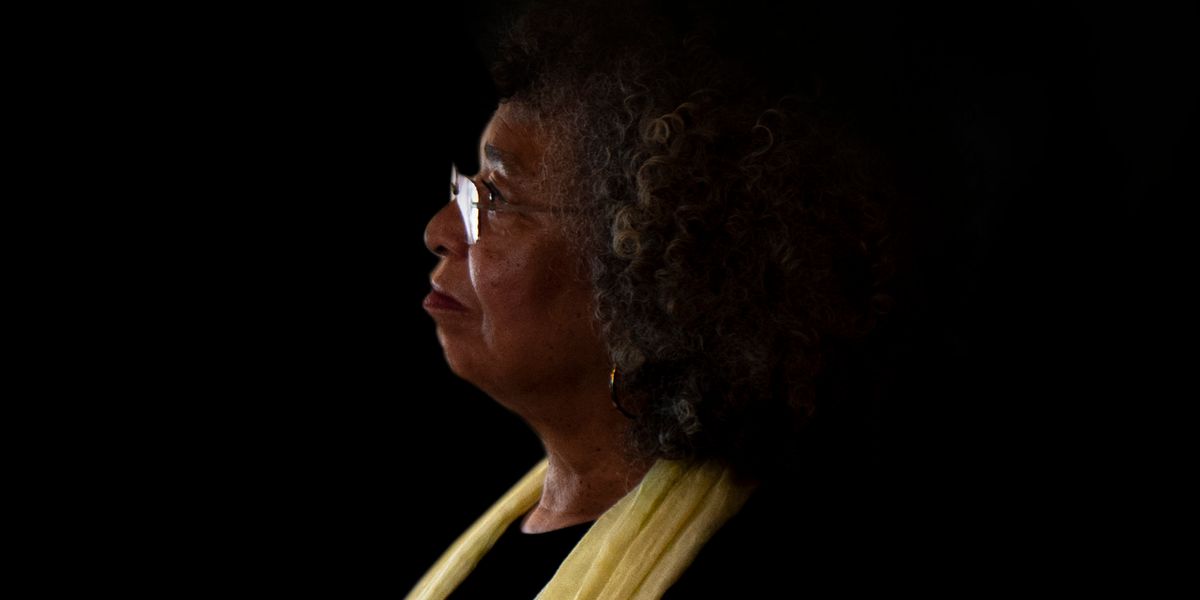
Know Your Rights
You Have the Right to Be Brilliant: Dr. Angela Davis
Interviews Curated by Colin Kaepernick / Photography by Shawn Theodore
20 August 2019

All Introductions by: Know Your Rights Camp members Miabelle Bocicault, Dr. Ameer Hasan Loggins, Dr. Christopher Petrella
Dr. Angela Davis' brilliance is politics in motion. Active in the struggle for Black liberation for over 50 years, Dr. Davis has pursued racial justice whatever the cost. From prison abolition to Black feminist theory to cultural critique to LGBTQ advocacy, she has championed the notion that a world of full human flourishing is worth pursuing. Dr. Davis blends theory and practice to live out her values in real time. Formerly on the FBI's 10 Most Wanted list in October 1970 for her political activism, and subject of then-California Governor Ronald Reagan's campaign to prevent her from teaching in the state university system, Davis is now a Distinguished Professor Emerita in U.C. Santa Cruz's History of Consciousness Department. The author of nine books and scores of articles, she also lectures regularly across the world. Throughout her career, Dr. Davis has used her intellectual acumen, voice and scholarship to uplift the brilliance of Black people across the diaspora. Dr. Davis represents the right to theorize the world in order to change it and the right to demand answers from the powerful to inconvenient questions in the present.

Why does society discredit the brilliance of Black people?
Dr. Angela Davis: I think society tends to discredit the brilliance of Black people because that brilliance always pushes us forward. It pushes us into positions that may not be exactly comfortable. It seems to me that when you're talking about the United States of America, every major step forward in the expansion and development of democracy has happened as a result of Black people's brilliance.
Why are people scared of Black brilliance?
AD: Black people have always demanded change, always demanded transformation. This is why Black people in this hemisphere are so important to world history. Since the advent of slavery, Black people have been fighting back, and have used their knowledge, their insight, their collective brilliance to challenge that predicament, and, in the process, have pushed the entire world in a progressive direction.
What made the creation of the Black Panther Party brilliant?
AD: Huey Newton and Bobby Seale had the idea to challenge the police occupation of Black communities here in Oakland by using strategies that were very different from what was associated with the civil rights movement at that time. And so patrolling the community with a gun in one hand symbolizing resistance, a law book in the other symbolizing rights. They approached people, Black people who were being stopped by the cops, and simply asked them, "Do you know your rights?" That was revolutionary.
What does "You have the right to be brilliant" mean to you?
AD: Well, I think of brilliance as a collective phenomenon, and I think that true brilliance emanates from and results in collective processes and collective changes. So the right to be brilliant would encompass the right to education, the right to discover one's own passions, but also the right to sustenance, the right to a job, the right to housing, the right to healthcare, the right to mental healthcare, the right to all of those conditions that make it possible for people to discover who they are and who they can be, in conjunction with all of their friends and comrades.
For more resources related to You Have the Right to Be Brilliant, visit: www.criticalresistance.org.
Artist's Statement by Shawn Theodore:
My style of silhouette photography is a direct acknowledgement of philosopher Alain Locke, the "Dean" of the Harlem Renaissance. His intellectual contributions to the artists and scholars of the Black Arts revolution gave a new sense of pride and advocated dignity in African American culture. His writings impacted painter Aaron Douglas, who created works in stylized silhouettes, which connected the aesthetics of the Motherland to the newly minted agency of the "New Negro." These depictions of Black life and spirituality are at the root of my pride, process and practice, and are evident in this portfolio.
Photography: Shawn Theodore
Booking: Jill Demling
Interviews Curated by: Colin Kaepernick
All Introductions by: Know Your Rights Camp members Miabelle Bocicault, Dr. Ameer Hasan Loggins, Dr. Christopher Petrella